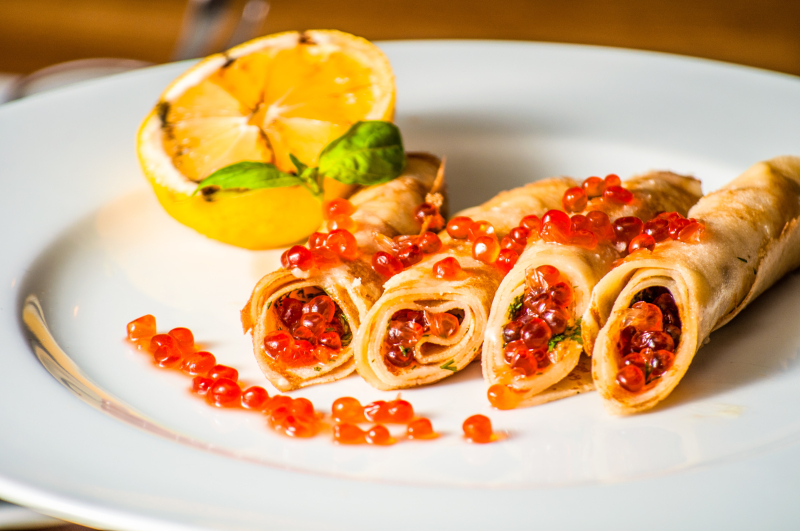Maslenitsa is an ancient pre-christian holiday celebrated by all Slavic people. As of now, it has become closely intertwined with Christian traditions and precedes the beginning of Lent. The main theme of the holiday is parting with winter and welcoming spring, which is reflected in its traditional fertility rites.
The main symbol of Maslenitsa are the world-renowned Russian pancakes, they are very thin pancakes, very similar to French crepes. In a way, pancakes are like pizza — a simple dough with an incredible amount of different fillings. Yet, unlike with pizza, the fillings can be sweet, as well.
So, what are these pancakes made of? The simple dough is made of flour, water, milk and eggs, sometimes with butter. Yet, the fillings are most diverse! Most foreigners believe that pancakes are to be eaten with caviar. Of course you can do that, but there are lots of other options. The simplest one is to dip them in melted sweet butter (just try not to think about the calories), or in cream with condensed milk (forget about calories all the more). Any kind of jam will do as well. You can also fill the pancake with bananas and chocolate. If fish is something you want, but you don’t have caviar — try pickled salmon (be careful about trying pickled herring — though it is a traditional Russian recipe, one has to get used to it since childhood). Mushrooms, cottage cheese, berries, minced meat… all of those are great fillings as well. So, be sure to try out as many as you can!
Maslenitsa is celebrated over the entire week, each day having its own name and meaning. For instance, Wednesday is "lakomka" (sweet-tooth), on this day the son-in-law comes to visit his mother-in-law. She pays a return visit on Friday, which is called "teshiny vecherki" (mother-in-law's evenings) to eat pancakes at his house and check if her daughter learned to cook them properly. The Sunday is called "Forgiveness Sunday"; on this day, it is common to ask your relatives and friends for forgiveness for whatever you did during the year; this is totally voluntary and does not imply going into details. The traditional answer is "forgive me as well".
Surely, few follow all these traditions, yet everyone is eating pancakes at home, cafes, and bringing them to work. So, try to forget about counting your calories, and enjoy this week to its fullest! Moreso, right after the Maslenitsa week it’ll be the time for Lent, so there’ll be lots of dietary and simple foods in cafes.
On Saturday and Sunday, there are open air celebrations that are usually held in parks or public gardens, featuring traditional music, active games, and burning off the Maslenitsa effigy — the symbol of winter. So, here are some places where you can taste (literally) this feast. Choose any or visit all!
Right in the city center, near the Yekaterininsky garden, a major Maslenitsa celebration will be held throughout the week, starting at 13:00 on every day. The event will feature different shows, music, gift shops and, of course, pancakes — as well as other Russian cuisine.
A more traditional Maslenitsa event will be in the Yusupov Garden on February, 26th. The event will include such activities as storming of a snow fortress, circle dancing, jumping across fires and the like, in which anyone can participate. At 15:30, there’ll be burning of the Maslenitsa effigy and a fire show.
Another major celebration will be held across the whole of Yelagin Island on the same day, featuring many different show programs and activities. The event will start at 12:00 and finish at 18:00; the entrance fee is 200 rub.
A slightly different celebration will take place at the Polytechnic University — apart from the traditional features, it will include a student’s science contest, as well as a contest for the best Maslenitsa effigy. At the same time, there will be a musical program at the university’s White Hall, featuring a renowned Russian accordionist Yuri Shishkin and then a concert by John Marshall, a jazz musician from New York.
If it's not the tradition, but just the festive atmosphere you are looking for, you can try going to the "Maslenitsa on the Roof" event at the Loft Project ETAGI. They offer lots of different pancakes, mulled wine — and a great view from the roof right over the city center.
If you plan to leave the city for the weekend, you may well try visiting the celebrations in Pavlovsk, a picturesque St. Petersburg suburb with a famous historic park. The event there offers a variety of programs and attractions, and will surely be a great "Russian" experience.
Hope you find this information useful — and have a nice Maslenitsa!
When, Where, What and Fee
- http://peterburg2.ru/events/interaktivnye-meropriyatiya-maslenica-tradicii-zimnih-prazdnikov-v-russkih-semyah-143 123.html
- For Students http://peterburg2.ru/events/maslenica-v-politehnicheskom-143 447.html
- Near St. Petersburg http://peterburg2.ru/events/maslenica-v-pavlovskom-parke-143 121.html
- On the Roof http://peterburg2.ru/events/maslenica-na-kryshe-loft-proekta-etazhi-143 421.html

